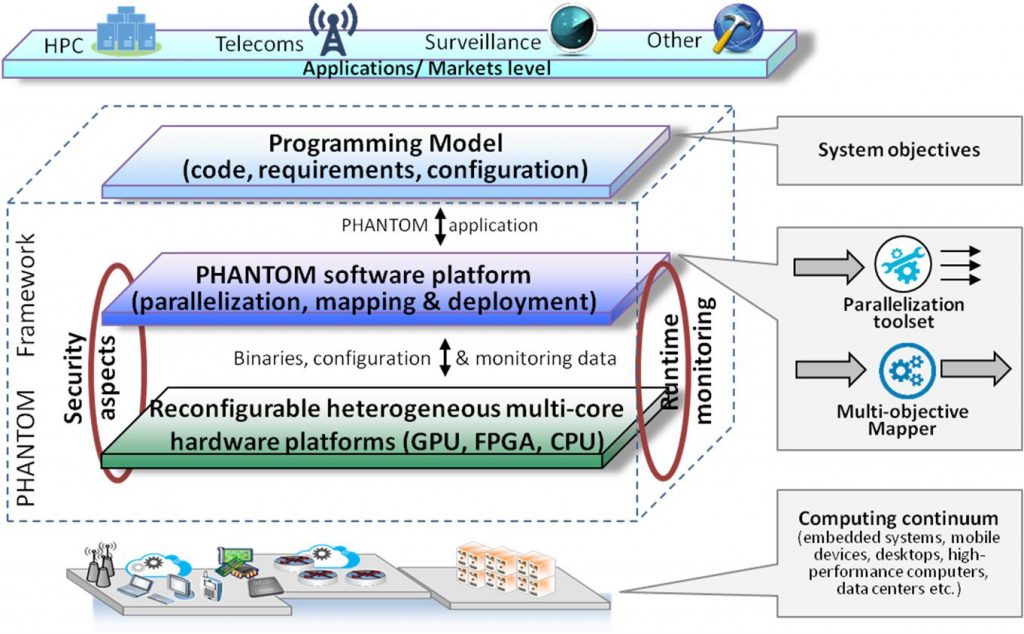Published on 31/01/2022

About the project:
“Today, to out-compute is to out-compete”. Computing is recognized as a pervasive and crucial technological field in contributing to the excellence of science, the competiveness of Europe’s industry and economy in general, as well as in addressing grand societal challenges such as health, food, energy, transport and climate. However, although computing has reached an unparalleled progress and maturity the last years, it still remains a research topic as new requirements and challenges impose its transformative nature and adaptation.
Amongst the most prominent challenges, the following must be highlighted.
- Embedded computers are currently evolving into Cyber-Physical Systems (CPS) that require high performance, low latency and security.
- Physical limits in key hardware technologies impose better harvesting the computing power of heterogeneous platforms and accelerating hardware performance.
- Significant and accelerating energy consumption of Information and Communications Technologies (ICT) impose energy efficiency and lower-power computing.
- Today’s wide availability of computing technologies may prove to be an additional burden to programmers, if no tools become available to hide/abstract the hardware complexity.
Objective

The overall objective of PHANTOM project (http://www.phantom-project.org/) is to deliver an integrated cross-layer (hardware and system software/ programming environment), multi-objective and cross-application approach that will enable next generation heterogeneous, parallel and low-power computing systems, while hiding the complexity of computing hardware from the programmer, thus fostering productivity in programming. PHANTOM targets a range of ‘application classes’ covering the entire computing continuum, from resource-constrained embedded devices up to powerful multi-core compute clusters.
Use cases/Verticals
PHANTOM outcome is validated in three (3) use cases, in order to prove a cross-application and scalable market approach, at both lab validation scale and industrial trials.
- Telecommunication Use Case based on Network Control Platform.
- High Performance Computing (HPC) use case in terms of Parametric Study for Complex Simulations.
- Surveillance systems for the detection of vessels/boats used for illegal activities.
WINGS involvement
WINGS is the Technical leader of PHANTOM and WP2 (Multi-dimensional optimization on heterogeneous systems) leader.
Designed/developed by WINGS technologies and tools comprise.
Programmer- and productivity- oriented software tools:
- Component-based programming model, starting with the embedded case and scaling up to the cloud, enumerating shared data and communications, capturing non-functional requirements and supporting concerns of security and isolation of components.
- Schemes/algorithms to parallelize code, optimized for heterogeneous platforms (CPUs, GPUs, FPGAs).
Multi-dimensional optimization on heterogeneous systems:
- Multi-objective mapping of application components to heterogeneous multi-core HW platforms for user requirements satisfaction and maximum performance (latency, energy, security).
- Data analytics in terms of prediction of upcoming system states and dependency detection between monitoring metrics.
WINGS prospects
WINGS delivers software-intensive services and products in a range of areas, comprising smart wireless access, cloud continuum, software networks, verticals, big data analytics, security. In order to maximize the speed of implementations, our company has started the stream of work that is targeted to hardware-based smart systems. For instance, in a micro/nano-scale direction, WINGS has the opportunity to participate in the H2020 projects of PROTEUS (related to water monitoring) and PhasmaFOOD (related to food safety). Also with respect to wireless infrastructures, WINGS is participating in the H2020 5GPPP project called Flex5Gware and is coordinated by Intel Mobile Communications. Moreover, WINGS delivers services to the energy, banking and telco sectors through cooperation with large vendors.
Processing/computing is in the intersection of all the above services/developments. WINGS needs to constantly upgrade the services offered by its computing assets, spanning from resource-constrained embedded devices up to cloud infrastructure. In this respect, PHANTOM is a project which will enable WINGS to combine intelligence with low-power, embedded computing systems including the distribution of intelligence to computing elements. Novel prototypes will be used as a basis for seeking point-to-point contracts with existing (e.g. Intel) and new costumers, as well as venture capital funds for development of products in the area of low-power, embedded computing systems.
Awards/demonstration video
TBA
Website: www.phantom-project.org
Framework: H2020 Customised and low power computing
Duration:
![]() This project has received funding from the Horizon 2020 programme under grant agreement No 688146
This project has received funding from the Horizon 2020 programme under grant agreement No 688146


